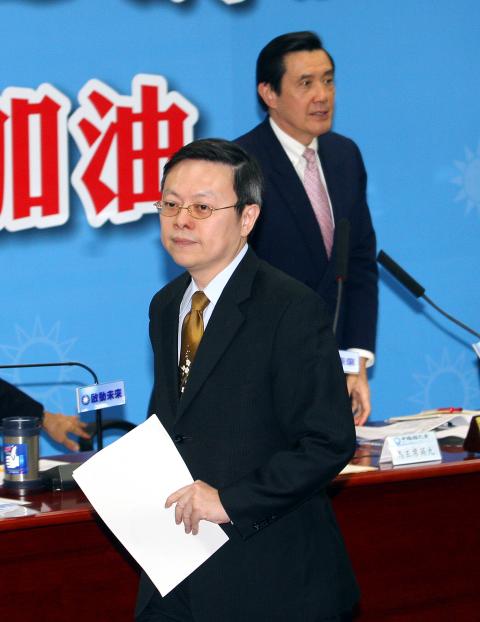Chinese President Xi Jinping’s (習近平) comments that suggested using the longstanding Beijing cross-strait initiative of “one country, two systems (一國兩制)” in dealing with Taiwan violated mainstream public opinion in the nation and will not be accepted as an option in cross-strait relations, the Democratic Progressive Party (DPP) said yesterday.
In Xi’s meeting with former vice president Lien Chan (連戰) in Beijing on Tuesday, Xi was quoted by state-owned Xinhua news agency as saying that China “respects the social system and lifestyle that Taiwanese compatriots have chosen” and it “completely understands how Taiwan compatriots feel.”
However, “family affection will help heal past wounds” and Beijing has “patience and confidence” that the existing problems would be solved, Xi was quoted as saying in the meeting with Lien, who is scheduled to conclude his four-day visit today.

Photo: CNA
The Chinese president reiterated that “it has never changed, and will never change, that we belong to one nation.”
“Xi was basically again proposing ‘one country, two systems,’ but the majority of Taiwanese do not accept it,” the DPP’s Policy Research Committee executive director Joseph Wu (吳釗燮) told a press conference.
The mainstream public opinion in Taiwan as well as the DPP’s view are clear, as various polls have showed, that people see Taiwan as an independent and sovereign country without subordination, and any change to the “status quo” would require the consent of the 23 million Taiwanese, Wu said.
Wu said that China has not only tried to undermine relations between the Chinese Nationalist Party (KMT) and the DPP, but also the KMT’s internal relations. For example, Beijing received Lien, a former KMT chairman, with higher-level protocol than it did Mainland Affairs Council (MAC) Minister Wang Yu-chi (王郁琦), who as a representative of President Ma Ying-jeou (馬英九) met with his Chinese counterpart last week in Nanjing for the first governmental meeting between the two sides in 65 years, he said.
“It’s clear that Lien no longer represents Ma. I would say that Beijing is trying to exploit the strained relations between Lien and Ma to its advantage. To me, it did not look like Lien was trying to create an opportunity for a proposed Ma-Xi meeting,” Wu said.
Responding to the issue before the party’s weekly Central Standing Committee meeting, DPP Chairman Su Tseng-chang (蘇貞昌) said Lien’s view was his own and represented neither the KMT administration’s official position nor the opinion of Taiwanese.
The MAC responded to the Lien-Xi meeting in a press release yesterday, reiterating the Ma administration’s insistence that cross-strait relations would be promoted based on the foundation of “the [so-called] ‘1992 consensus’ and ‘one China with different interpretations (一中各表)’ initiative” and that the “status quo” would be maintained with “no unification, no independence and no use of force.”
The ministry called on Beijing to face reality so that bilateral relations could be further developed with mutual trust.
Taiwan Solidarity Union (TSU) Chairman Huang Kun-huei (黃昆輝) lambasted Lien for saying that cross-strait relations are not international relations, saying Lien had betrayed the people of Taiwan in exchange for benefits to himself and his family.

Alain Robert, known as the "French Spider-Man," praised Alex Honnold as exceptionally well-prepared after the US climber completed a free solo ascent of Taipei 101 yesterday. Robert said Honnold's ascent of the 508m-tall skyscraper in just more than one-and-a-half hours without using safety ropes or equipment was a remarkable achievement. "This is my life," he said in an interview conducted in French, adding that he liked the feeling of being "on the edge of danger." The 63-year-old Frenchman climbed Taipei 101 using ropes in December 2004, taking about four hours to reach the top. On a one-to-10 scale of difficulty, Robert said Taipei 101

Nipah virus infection is to be officially listed as a category 5 notifiable infectious disease in Taiwan in March, while clinical treatment guidelines are being formulated, the Centers for Disease Control (CDC) said yesterday. With Nipah infections being reported in other countries and considering its relatively high fatality rate, the centers on Jan. 16 announced that it would be listed as a notifiable infectious disease to bolster the nation’s systematic early warning system and increase public awareness, the CDC said. Bangladesh reported four fatal cases last year in separate districts, with three linked to raw date palm sap consumption, CDC Epidemic Intelligence

Two Taiwanese prosecutors were questioned by Chinese security personnel at their hotel during a trip to China’s Henan Province this month, the Mainland Affairs Council (MAC) said yesterday. The officers had personal information on the prosecutors, including “when they were assigned to their posts, their work locations and job titles,” MAC Deputy Minister and spokesman Liang Wen-chieh (梁文傑) said. On top of asking about their agencies and positions, the officers also questioned the prosecutors about the Cross-Strait Joint Crime-Fighting and Judicial Mutual Assistance Agreement, a pact that serves as the framework for Taiwan-China cooperation on combating crime and providing judicial assistance, Liang

US climber Alex Honnold left Taiwan this morning a day after completing a free-solo ascent of Taipei 101, a feat that drew cheers from onlookers and gained widespread international attention. Honnold yesterday scaled the 101-story skyscraper without a rope or safety harness. The climb — the highest urban free-solo ascent ever attempted — took just more than 90 minutes and was streamed live on Netflix. It was covered by major international news outlets including CNN, the New York Times, the Guardian and the Wall Street Journal. As Honnold prepared to leave Taiwan today, he attracted a crowd when he and his wife, Sanni,